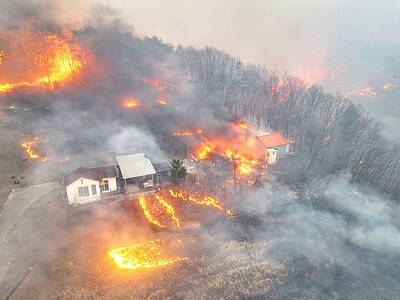Cuban President Raul Castro sought on Wednesday to revive Soviet-era ties with Moscow as he paid the first visit to Russia by a Cuban leader since the Cold War.
The visit comes as both countries watch for change in the foreign policy of the US, which came under heavy Russian criticism in the era of former US president George W. Bush and which maintains a blockade of the island. Castro, who took over as president from his ailing brother Fidel in 2006 and arrived in a Russian presidential plane dispatched from Moscow, said his visit would expand relations with Russia — healing a rift that appeared with the Soviet Union’s collapse and the end of Soviet subsidies.
“We know what happens on the planet when equality is destroyed, when they start wars, attacks and are unjust in their relations,” the 77-year-old leader said in a clear reference to the US, quoted by ITAR-TASS.
“We, like many others, see Russia’s rebirth as a positive factor,” Castro told the Russian news agency. “Relations between Russia and Cuba are excellent and this visit to Moscow will serve to strengthen ties between our countries.”
Castro’s visit was to begin in earnest when he was due to be hosted yesterday by Russian President Dmitry Medvedev at a country residence west of Moscow usually used for special guests of the Russian leader.
Formal talks between the two delegations will take place today at the Kremlin.
Cuban-Russian relations took a turn for the better in November when Medvedev visited Havana on a Latin American tour aimed at restoring what he called “privileged” Soviet-era relations with the region. Last month a group of Russian warships visited Havana on a tour seen as a deliberate attempt to challenge US dominance in Latin America, although US officials have remained sanguine about such Russian manoeuvres.
On the current visit the focus will be on tying up a raft of business deals that include plans for a Russian consortium to explore oil fields off Cuba’s coast in the Gulf of Mexico and plans for cooperation in nickel production on the island, officials have said.
Russia also may well reaffirm its support for the lifting of the US economic blockade of Cuba.
“Our country has consistently stood for normalizing the situation around Cuba, for its fully fledged reintegration into regional and world processes,” Russian Foreign Minister Sergei Lavrov said in comments released on Wednesday.
“What is important is that Latin American countries are united in their efforts to overcome Havana’s isolation,” Lavrov said.
Russia expects that new US President Barack Obama’s promises of change “will help to strengthen stability in international relations and have a favorable effect on the situation in Latin America,” Lavrov said.

A French-Algerian man went on trial in France on Monday for burning to death his wife in 2021, a case that shocked the public and sparked heavy criticism of police for failing to take adequate measures to protect her. Mounir Boutaa, now 48, stalked his Algerian-born wife Chahinez Daoud following their separation, and even bought a van he parked outside her house near Bordeaux in southwestern France, which he used to watch her without being detected. On May 4, 2021, he attacked her in the street, shot her in both legs, poured gasoline on her and set her on fire. A neighbor hearing

DEATH CONSTANTLY LOOMING: Decades of detention took a major toll on Iwao Hakamada’s mental health, his lawyers describing him as ‘living in a world of fantasy’ A Japanese man wrongly convicted of murder who was the world’s longest-serving death row inmate has been awarded US$1.44 million in compensation, an official said yesterday. The payout represents ¥12,500 (US$83) for each day of the more than four decades that Iwao Hakamada spent in detention, most of it on death row when each day could have been his last. It is a record for compensation of this kind, Japanese media said. The former boxer, now 89, was exonerated last year of a 1966 quadruple murder after a tireless campaign by his sister and others. The case sparked scrutiny of the justice system in

DITCH TACTICS: Kenyan officers were on their way to rescue Haitian police stuck in a ditch suspected to have been deliberately dug by Haitian gang members A Kenyan policeman deployed in Haiti has gone missing after violent gangs attacked a group of officers on a rescue mission, a UN-backed multinational security mission said in a statement yesterday. The Kenyan officers on Tuesday were on their way to rescue Haitian police stuck in a ditch “suspected to have been deliberately dug by gangs,” the statement said, adding that “specialized teams have been deployed” to search for the missing officer. Local media outlets in Haiti reported that the officer had been killed and videos of a lifeless man clothed in Kenyan uniform were shared on social media. Gang violence has left

‘HUMAN NEGLIGENCE’: The fire is believed to have been caused by someone who was visiting an ancestral grave and accidentally started the blaze, the acting president said Deadly wildfires in South Korea worsened overnight, officials said yesterday, as dry, windy weather hampered efforts to contain one of the nation’s worst-ever fire outbreaks. More than a dozen different blazes broke out over the weekend, with Acting South Korean Interior and Safety Minister Ko Ki-dong reporting thousands of hectares burned and four people killed. “The wildfires have so far affected about 14,694 hectares, with damage continuing to grow,” Ko said. The extent of damage would make the fires collectively the third-largest in South Korea’s history. The largest was an April 2000 blaze that scorched 23,913 hectares across the east coast. More than 3,000